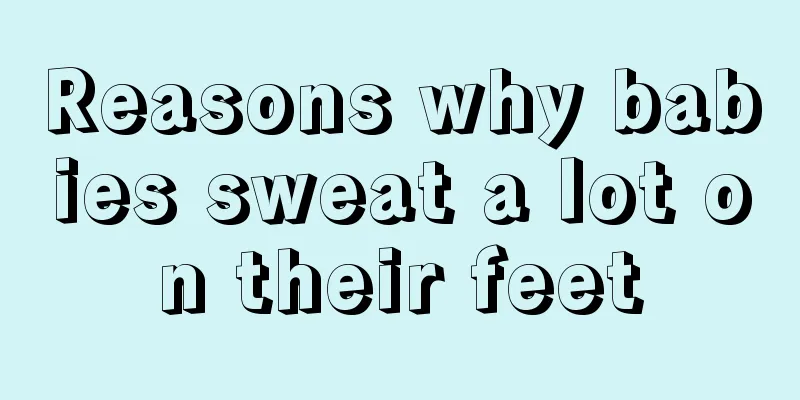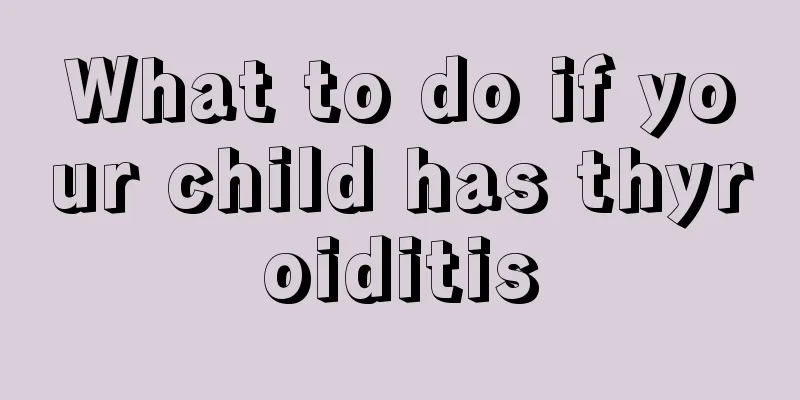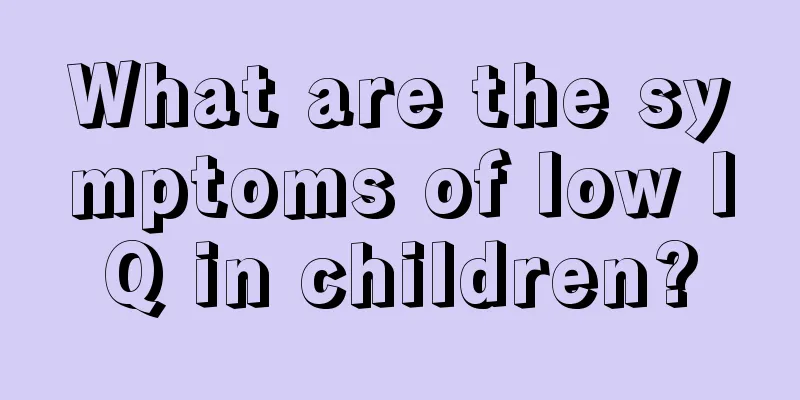Reasons why babies sweat a lot on their feet

|
Babies are a relatively vulnerable group. In daily life, we should patiently protect babies and let them grow up healthily. During the baby's growth process, some situations are inevitable, such as the baby's feet sweating a lot. What causes this? It may be because the baby is wearing too many clothes, or the baby's sweat glands secrete too quickly. Parents are generally more concerned about their children's affairs. Let's learn about the reasons why babies sweat a lot on their feet. Infants and young children have an active metabolism and are active and lively. Some of them cannot rest even after going to bed at night, so they may sweat on their heads after falling asleep. The so-called physiological hyperhidrosis refers to sweating during sleep when the child is well-developed, healthy, and has no disease. Parents are often accustomed to deciding the best environmental temperature for their children based on their own subjective feelings, and like to cover their babies with more blankets and keep them tightly covered. Because children's brain and nervous system are not yet fully developed and they are in the growth and development period, their body metabolism is very active. Coupled with the stimulation of overheating, they can only regulate normal body temperature by sweating to evaporate the heat in the body. In addition, drinking milk, malted milk or eating chocolate before going to bed can also cause sweating in children. Some parents give their children milk, malted milk, etc. before they go to sleep. After the child falls asleep, the body produces a large amount of heat, which is mainly dissipated through sweating through the skin. In addition, too high room temperature or excessive warmth can also cause children to sweat while sleeping, which are all physiological sweating. Pathological sweating occurs when the child is in a quiet state, such as sweating caused by rickets, which manifests as obvious sweating on the child's head in the first half of the night after falling asleep. Because the pillow is irritated by sweat, babies often shake their heads and rub against the pillow when they sleep, resulting in sparse hair and loss of hair on the pillow, forming typical annular hair loss on the pillow, which is medically known as "occipital baldness". It is an early manifestation of rickets in infants. As long as vitamin D and calcium are supplemented in time, rickets can be controlled and sweating will stop by itself. If a child sweats not only in the first half of the night but also in the second half of the night and before dawn, it is usually a sign of illness, the most common of which is tuberculosis. Tuberculosis also has other symptoms, such as low fever, fatigue, loss of appetite, flushed cheeks, etc. Children with tuberculosis tend to sweat easily during daytime activities, which is called spontaneous sweating, and sweating at night is called night sweats. If you suspect your child is infected with tuberculosis, a lung X-ray or a tuberculin test should be done for timely diagnosis and treatment. Heart disease, diabetes (hypoglycemia), tuberculosis or breathing problems during sleep, because the internal pressure (lesions) of the body causes the sympathetic nerves to be in a state of tension all the time, may also cause "night sweats" or "cold sweats on hands and feet". This is a long-term symptom. If parents are worried, they can take the baby to a pediatric clinic or hospital for examination, listen to the heartbeat for abnormalities, feel the belly for lumps (tumors), check whether the upper respiratory tract is unobstructed or whether the baby has allergies, etc., to eliminate doubts in their hearts. Clinical observations show that children with night sweats often suffer from internal heat. One reason is heat accumulation in the spleen and stomach, and the other is internal heat due to yin deficiency. The heat forces body fluids out, so the night sweats continue. If the heat is not cleared, the sweating cannot be stopped. To eliminate night sweats, you must clear the heat. Children with heat accumulation in the spleen and stomach may have a brisk or reduced appetite, good spirits, constipation, and frequent bowel movements. Although they are thin, they do not feel tired and they play all day long. The principle of treatment is to clear away heat and promote bowel movements to expel the heat. The most common type is Yin deficiency and internal heat. Due to long-term night sweats, the body fluid is consumed excessively, resulting in a Yin deficiency phenomenon. The children have red and dry lips and tongue, hot hands and feet, dry mouth, and bowel movements every few days with dry and granular feces. The treatment should be to clear away heat and nourish yin so that the heat can be eliminated internally and the sweat can be eliminated quickly. Children with night sweats are often prone to catching colds, and very few of them are truly physically weak. Most of them kick off the quilt in their dreams due to sweating, and catch a cold. This should be distinguished from a cold caused by physical weakness. Some children with night sweats do not suffer from internal heat accumulation. They sweat a lot, are prone to catching colds and coughs, and are afraid of the cold. They sweat easily even with a little exercise. For such children, it is not advisable to blindly use tonics during treatment. Instead, the spleen and stomach can be harmonized. Children with weak constitutions often sweat in patches on their head, chest, and back when they are active during the day or after falling asleep at night. It is often caused by malnutrition due to improper feeding or poor digestion and absorption. In terms of nursing, attention should be paid to adjusting feeding methods, promoting children's appetite, and increasing the intake of protein, fat and sugar. If necessary, traditional Chinese medicine can be used to regulate spleen and stomach disharmony. The reasons why babies sweat a lot on their feet are rather complicated, so parents should distinguish them well. Moreover, for babies, some minor illnesses are also necessary for growth, so parents should not worry too much. If there are any abnormalities, they should go to the hospital for treatment immediately. Do not delay the best time for treatment, so as to better protect the baby's health. |
<<: What to do if your child's head sweats
>>: Introduction to red tip of baby's tongue
Recommend
Baby has fever and low neutrophil count
When your baby has a fever, if you do a routine b...
What are the symptoms of myocarditis in children?
Children's physical health has always been a ...
Why do children cry at night?
After a busy day at work, we parents really want ...
Why does a newborn baby wake up from sleep?
Everyone knows that there are many problems for n...
How big is a baby's stomach?
Sometimes babies spit up milk, sometimes because ...
What are the symptoms of premature development in boys?
In recent years, premature development of young c...
The difference between umbilical cord protection and umbilical cord protection stickers
Umbilical cord protectors and umbilical cord stic...
How to make blueberry puree for baby food
For some babies, you can give them some fruit pur...
9-year-old girl has a lump on her chest
Women's breasts and men's penis are the m...
What foods should children eat less? Eat less of these 7 foods
Parents need to pay attention to their baby's...
What causes children to sweat easily?
What is the reason why children sweat easily? Man...
Why does a child's heart beat so fast?
When the baby is just born, parents are full of c...
Why do children's knees make cracking sounds? Causes of cracking knees
Children's knee joints may make parents worry...
Children with mental retardation
Some parents find that their children develop lat...
Why does my child have a stomachache after eating?
The process of a child's continuous growth is...









